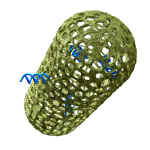February 16, 2015 /

Under development at Innate Immunotherapeutics is a special drug candidate to treatsecondary progressive multiple sclerosis (SPMS). Currently, no viable therapies exist for SPMS — only less-effective means to treat SPMS patients through drugs designed for relapse-remitting multiple sclerosis — making the prospect of Innate’s experimental SPMS therapy a promising one for progressive multiple sclerosis patients. So far, one completed phase 1 /2 clinical trial investigated the company’s drug, known as MIS416, in patients with SPMS or primary progressive multiple sclerosis (PPMS), and another phase 2B clinical trial is recruiting patients with SPMS in Australia.
As described by Innate Immunotherapeutics’ web page dedicated to MIS416, treatment stimulates signal transduction pathways in myeloid cells central to innate immune responses. According to Chief Executive Officer of Innate Immunotherapeutics, Simon Wilkinson, MIS416 is the only known drug candidate that targets and amplifies regulatory myeloid cell activities.
MIS416 comprises approximately 0.5 x 2.0 microns in size, containing naturally occurring proteins found in the body: TLR-9 and NOD-2 ligands. These particles target naturally anti-inflammatory myeloid cells, which are critical cells allowing the immune system to maintain homeostasis and initiate tissue repair pathways crucial to preventing deterioration in SPMS. A key feature of MIS416 is its specificity of activation, as cell activation occurs only when the microparticles are internalized and degraded within the cell to release the ligands. This is likely to be one of the reasons that trial outcomes to date have demonstrated a good safety profile for MIS416.
The idea for MIS416 was first imagined by Dr. Frank Gelder in the mid-1990s while working at Louisiana State University. MIS416 was part of his program initiated to develop passive immunotherapeutics to treat late-stage AIDS patients. Existing adjuvant therapeutics were not potent enough, and he wanted to create a microparticle-based adjuvant onto which he could attach anti-HIV antigens.
~~~~~~~~~~~~~~~~~~~~
.
.
.
Visit our MS Learning Channel on YouTube: http://www.youtube.com/msviewsandnews
Stay informed with MS news and information - Sign-up here
For MS patients, caregivers or clinicians, Care to chat about MS? Join Our online COMMUNITY CHAT




